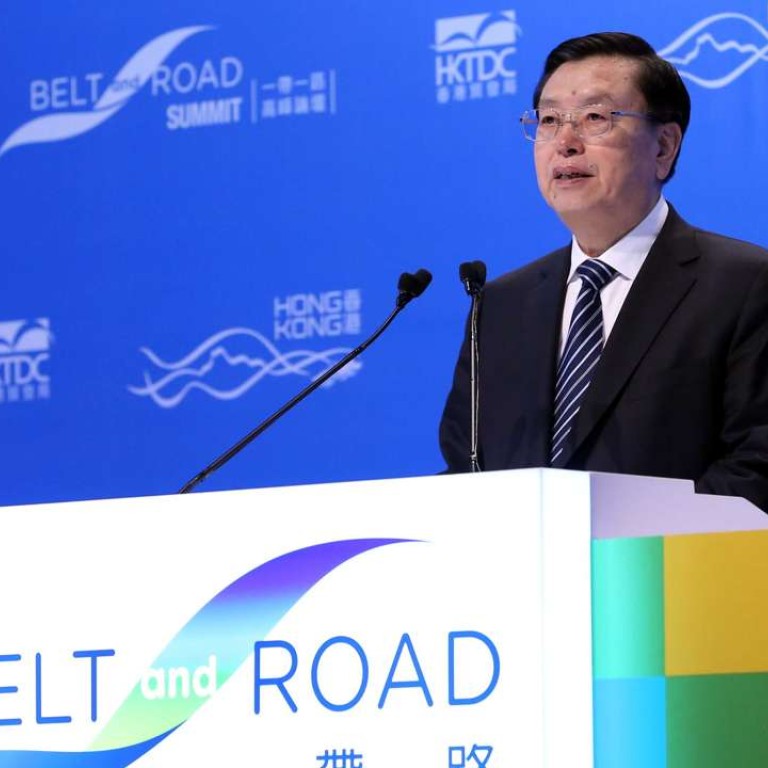
One Belt, One Road: Hong Kong’s position in the Pearl River Delta ‘gives it an edge’
China’s third highest-ranking official on Wednesday outlined how Hong Kong could seize the opportunities of the “One Belt, One Road” initiative, stressing that the city’s position in the Pearl River Delta gave it an edge.
Observers said incorporating the city into the plan was to be expected, given much of the groundwork was already laid by a scheme to unite the economies of the pan-Pearl River Delta region. Hong Kong was also a natural stepping-off point for Beijing as it sought to project its power throughout Southeast Asia, they said.
Zhang Dejiang, chairman of the Standing Committee of the National People’s Congress, said Hong Kong was well situated and had easy economic access to the mainland, especially those areas that were on the forefront of innovation and market reforms.
For first time, Zhang Dejiang spells out how Hong Kong can seize key role in One Belt, One Road
“As a natural partner, Hong Kong can join forces with the pilot free-trade zone in Guangdong and the Qianhai Shenzhen-Hong Kong cooperation zone and Fujian province, a core area for the 21st Century Maritime Silk Road,” Zhang said at the Belt and Road Summit in Hong Kong yesterday.
He was referring to an initiative touted by Beijing to revive an ancient trade route running from China through Southeast Asia and the Indian Ocean to Europe.
Zhang kick-started the pan-Pearl River Delta strategy while he was party secretary of Guangdong province from 2002 to 2007.
Hong Kong, one of the key players in the pan-Pearl River Delta region, can benefit from synergy within the region
Huang He, a professor of internation studies at Fudan University, said Zhang’s speech pointed to Beijing’s support for Hong Kong.
“Hong Kong, one of the key players in the pan-Pearl River Delta region, can benefit from synergy within the region, as cities across the border are expected to complement each other’s advantages in a tie-up to seek opportunities along the route,” Huang said.
In March, the State Council issued a guideline on deepening cooperation within the pan-delta, which is comprised of nine mainland provinces – Fujian, Jiangxi, Hunan, Guangdong, Guangxi, Hainan, Sichuan, Guizhou and Yunnan – and Hong Kong and Macau.
According to the guidelines, deeper cooperation within the delta will smooth the way for the belt initiative and strengthen cooperation among the mainland and Hong Kong and Macau. The region covers about one-fifth of the nation’s land and accounts for a third of its population and a third of its economy.
The political angle to China’s ‘One Belt, One Road’ initiative
Some observers have already noted those closer ties were part of a bigger economic plan that includes the formation of the Asean Economic Community, or AEC. Deng Jiangnian, a researcher at the Guangdong Academy of Social Sciences, said in March the link-up between the pan-Delta and the AEC would play a significant role in the global economy.
Infrastructure, trade and people-to-people exchanges were creating a market boasting a population of 1.08 billion, a combined gross domestic product of US$5.5 trillion and annual trade worth US$3.8 trillion, Deng said.
Paul Skelton, HSBC’s regional head of commercial banking for Asia-Pacific, said in December the AEC would lead to further liberalisation of the flow of goods, services, capital and skilled labour.
It would open the door to significant new investment opportunities to enhance an already flexible and diverse supply chain within the Association of Southeast Asian Nations, Skelton said.
China’s ‘One Belt, One Road’ is the perfect stage for Hong Kong to showcase its strengths
Suan Teck Kin, senior economist at United Overseas Bank, said on Wednesday that from a broader perspective, the belt initiative indicated China was growing more confident in setting new rules on the world stage.
“In seeking win-win cooperation with countries along the routes, China is more and more confident to flex its muscle as a rising major economy,” Suan said.

